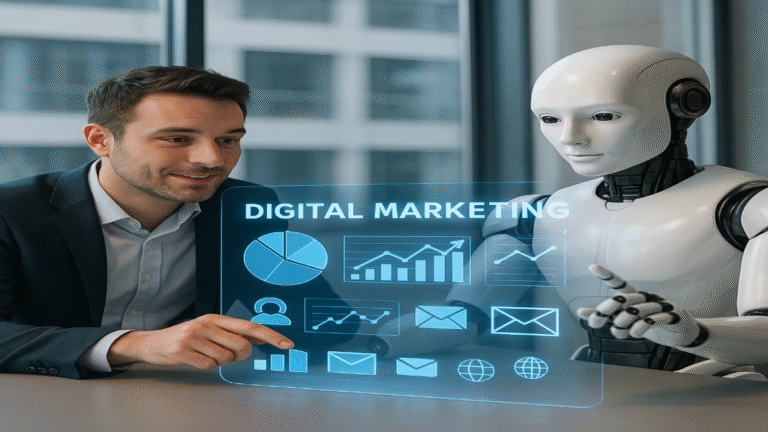
The Future of Marketing Teams: Collaborating with AI Co-pilots (And How to Thrive)
Meta Description: AI isn’t replacing marketers; it’s empowering them. Discover how future marketing teams will collaborate with AI co-pilots to boost creativity, efficiency, and strategic impact. Your guide to the new era.
The narrative around Artificial Intelligence in the workplace often swings between utopian visions of effortless productivity and dystopian fears of mass job displacement. For marketing teams, the reality is shaping up to be far more nuanced and, frankly, more exciting: AI is emerging not as a replacement, but as a powerful AI Co-pilot.
The marketing teams of the near future won’t be human or AI; they’ll be human-AI hybrids. This symbiotic relationship promises to unlock unprecedented levels of creativity, efficiency, data-driven insights, and strategic impact. But navigating this transition requires a shift in mindset, skill sets, and team structures.
Let’s explore what this collaboration looks like and how marketing professionals can prepare to thrive in an era where AI is an indispensable member of the team.
What is an “AI Co-pilot” in Marketing?
Think of an AI co-pilot as an intelligent assistant, a super-powered intern, a data-crunching savant, and a creative muse, all rolled into one. It’s a suite of AI tools and platforms designed to augment human capabilities, automate repetitive tasks, provide deep insights, and free up marketers to focus on higher-level strategy, creativity, and human connection.
Unlike autonomous AI that operates independently, an AI co-pilot works alongside human marketers, taking direction, offering suggestions, and handling the heavy lifting of certain tasks.
How AI Co-pilots Will Reshape Marketing Roles & Responsibilities
The integration of AI co-pilots won’t eliminate marketing roles, but it will significantly evolve them. Here’s how different functions might transform:
- Content Creation & Curation:
- AI Co-pilot: Generates first drafts of blog posts, social media updates, email copy, and ad creatives based on prompts. Suggests content topics based on trend analysis and keyword research. Helps personalize content at scale.
- Human Marketer: Provides strategic direction and creative briefs. Edits and refines AI-generated content for brand voice, authenticity, and emotional nuance. Focuses on storytelling, unique insights, and fact-checking. Curates and contextualizes AI-suggested content.
- Future Skill: Advanced prompt engineering, critical editing, brand voice stewardship.
- SEO & SEM:
- AI Co-pilot: Conducts large-scale keyword research and competitor analysis. Identifies technical SEO issues. Optimizes ad bids in real-time. Generates ad copy variations for A/B testing. Predicts search trends.
- Human Marketer: Sets overall SEO/SEM strategy. Interprets AI-driven insights to make strategic decisions. Focuses on E-E-A-T, link building strategy, and understanding nuanced search intent. Manages budgets and overarching campaign goals.
- Future Skill: Data interpretation, strategic SEO planning, understanding AI-driven bidding.
- Data Analysis & Insights:
- AI Co-pilot: Processes vast amounts of customer and market data. Identifies patterns, trends, and anomalies. Generates reports and dashboards. Segments audiences based on complex criteria. Provides predictive analytics (e.g., churn risk, LTV).
- Human Marketer: Asks the right questions of the data. Interprets AI-generated insights to inform strategy. Develops hypotheses based on data. Communicates insights effectively to stakeholders. Focuses on the “why” behind the data.
- Future Skill: Data literacy, critical thinking, storytelling with data.
- Personalization & Customer Journey Orchestration:
- AI Co-pilot: Dynamically personalizes website content, email messaging, and product recommendations in real-time for individual users. Optimizes customer journeys based on behavior.
- Human Marketer: Designs the overall personalization strategy and customer journey maps. Defines rules and parameters for AI-driven personalization. Ensures ethical data use and avoids the “creepy” factor. Focuses on empathy and understanding individual customer needs.
- Future Skill: Customer empathy, journey mapping, ethical AI application.
- Social Media Management:
- AI Co-pilot: Schedules posts. Monitors social conversations for brand mentions and sentiment. Suggests responses to common queries. Identifies trending topics and potential influencer partners.
- Human Marketer: Develops social media strategy and brand voice. Creates engaging, original content. Builds community and engages in nuanced conversations. Manages crises. Builds relationships with influencers.
- Future Skill: Community management, crisis communication, authentic engagement.
- Marketing Operations & Campaign Management:
- AI Co-pilot: Automates repetitive tasks like data entry, report generation, and lead scoring. Optimizes campaign workflows. Manages A/B testing logistics.
- Human Marketer: Oversees overall campaign strategy and execution. Manages budgets and resources. Solves complex operational challenges. Fosters cross-functional collaboration.
- Future Skill: Project management, strategic operations, workflow optimization.
The Benefits of Human-AI Collaboration in Marketing Teams
Integrating AI co-pilots isn’t just about efficiency; it’s about elevating the entire marketing function:
- Increased Productivity & Efficiency: Automating routine tasks frees up human marketers for more strategic work.
- Enhanced Creativity: AI can handle mundane aspects of content creation, allowing humans to focus on innovative ideas and unique angles. AI can also act as a brainstorming partner.
- Deeper Data-Driven Insights: AI can process and analyze data at a scale and speed humans cannot, uncovering valuable insights that inform better decision-making.
- Improved Personalization at Scale: Deliver highly relevant experiences to individual customers in real-time.
- Faster Speed to Market: Accelerate campaign launches and content publishing cycles.
- Better ROI: Optimized campaigns, more efficient resource allocation, and higher conversion rates contribute to improved return on investment.
- Upskilling & Professional Development: Marketers will develop new, valuable skills in AI literacy, data interpretation, and strategic thinking.
- Increased Job Satisfaction: By offloading tedious tasks, marketers can focus on more engaging and impactful aspects of their roles.
Preparing Your Marketing Team for the AI Co-pilot Era
Transitioning to an AI-augmented team requires proactive planning and development:
- Foster AI Literacy:
- Provide training on what AI is, how different AI tools work (especially those relevant to marketing), their capabilities, and their limitations.
- Encourage experimentation with AI tools in a safe environment.
- Identify Strategic Use Cases:
- Don’t adopt AI for AI’s sake. Identify specific marketing challenges or opportunities where AI can provide the most significant value. Start small and iterate.
- Invest in the Right AI Tools & Platforms:
- Select tools that genuinely augment your team’s capabilities and integrate well with your existing marketing stack. Consider specialized AI tools over general ones for specific tasks.
- Redefine Roles & Responsibilities (Gradually):
- As AI tools are adopted, collaboratively redefine roles to incorporate AI co-pilot responsibilities and highlight new areas of human focus.
- Prioritize Human-Centric Skills:
- Double down on skills AI cannot easily replicate: critical thinking, strategic planning, creativity, emotional intelligence, empathy, complex problem-solving, and ethical judgment.
- Develop Data Skills:
- Ensure your team can understand, interpret, and question data provided by AI. This includes understanding potential biases in AI models.
- Cultivate a Culture of Continuous Learning & Adaptability:
- The AI landscape is evolving rapidly. Encourage ongoing learning, curiosity, and a willingness to adapt to new tools and processes.
- Address Ethical Considerations Proactively:
- Establish guidelines for the ethical use of AI, particularly concerning data privacy, bias, transparency, and authenticity in AI-generated content.
- Lead with a Clear Vision:
- Leadership must champion the human-AI collaboration model, communicate its benefits, and support the team through the transition.
The Marketer of the Future: Strategic Thinker, Creative Problem-Solver, AI Collaborator
The fear of AI rendering marketers obsolete is largely unfounded. Instead, AI will empower marketers to be more strategic, more creative, and more impactful than ever before. The marketer of the future will be adept at leveraging AI co-pilots to handle the tactical execution, freeing them to focus on the uniquely human aspects of marketing: understanding customer needs deeply, crafting compelling narratives, building genuine relationships, and making wise strategic choices.
The journey involves learning new tools and adapting workflows, but the destination is a more dynamic, intelligent, and ultimately more human-centric marketing function.
Conclusion
The integration of AI co-pilots into marketing teams isn’t a distant future concept; it’s happening now. By embracing this collaboration, fostering AI literacy, and prioritizing human-centric skills, marketing teams can not only navigate this transformation but also unlock new levels of innovation and success. The future of marketing is not human versus machine, but human and machine, working together to achieve extraordinary results. The key is to start preparing today for the co-pilot-assisted tomorrow.



